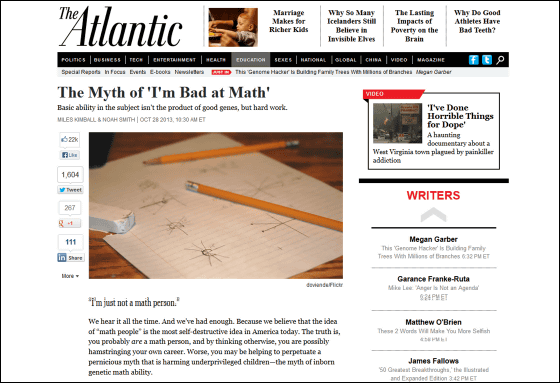"I am not good at mathematics" can be overcome by efforts rather than by nature

ByWoodleywonderworks
It seems that all countries have common sense that they are not good at mathematics and have a sense of refusal, such as "it is urticating only by listening to an equation", and in the United States "I'm bad at math (mathematics is a bad person)" And "I'm just not a math person (because it is not a person facing mathematics)". As a natural tendency to decide human capabilities as "naturalistic brain / science brain", the ability is not based on genetic factors but an opinion that it can be overcome by effort, Miles Kimball And Noah Smith put it together.
The Myth of 'I'm Bad at Math' - Miles Kimball & Noah Smith - The Atlantic
http://www.theatlantic.com/education/archive/2013/10/the-myth-of-im-bad-at-math/280914/

Miles Kimball is a professor of economics at the University of Michigan, Noah Smith is an Associate Professor at the State University of New York at Stony Brook. While teaching mathematics to students for a long time, they discovered that unfitness of mathematics (mathematics) is made in the following pattern.
1:Children go to elementary school and receive math lessons. But at this point there are children who have taught arithmetic in advance from their parents and children who have never touched it at all, and the level of preliminary knowledge has a considerable range.
2:If you test several times in the very early days, children with prior knowledge will get full marks, but children who do not have preliminary knowledge of mathematics can only clear problems that can be solved at the moment, so 80 It can only take about 85 points. For convenience, the former is group A and the latter is group B.
3:The children of group B thought that "genetic matters are involved in arithmetic (mathematics)" without knowing that the children who were full marks had preliminary knowledge Become. For that reason, "I do not think that math (mathematics) is suitable for me", after that I can not motivate, the difference will be on the other hand.
Four:The children of Group A come to think that "I am suitable for arithmetic (mathematics)", and since then I will be studying further, the advantage will be established.

ByWoodleywonderworks
America·Purdue UniversityHe is a psychologistPatricia Louise LinehanAccording to Mr.'s research, students with a tendency to change / upgrade as belonging to Group A mentioned above recognize that ability and knowledge will change with effort, and students who tend to fix like Group B , It is known that there is no capacity change or improvement by effort.
Psychologist Lisa Blackwell et al.the studyBut it is clear that the way of thinking about intelligence and knowledge has two directions "You can change your knowledge as much as possible" "knowledge has only fixed capacity and you can not change it yourself" , I also know that students who think "knowledge can change" have achieved high grades.
Social psychologist Richard Nisbett, a book "Intelligence and How to Get It"I introduce episodes that teaching to junior high school students of the poor minority group that" Intelligence can be improved by effort, brains are formed by learning ". According to Nisbett, the junior high school students who received this teaching improved their grades by recognizing the importance of efforts, but not only that, but because they are innocent by nature, they have to walk their lives in their poor life for the rest of the year It seems that children who had been convinced of crying, knowing that they can decide by themselves that they can train intelligence by their own efforts. actually,A boy whose IQ was judged to be 80 in the intelligence test resulted in IQ of 100 as a result of 3 years' effortsThere is a story saying.
Professors Kimball and Associate Professor Smith pointed out that the "innate theory" that affects mathematics is whether or not the inherent nature of the mathematics will be acquired later. Children from the fourth grade to the eighth grade in the United States (equivalent to 4th grade elementary school student in junior high school in Japan) have achieved better results than children in countries such as Germany, England, and Sweden, but the results are higher for high school students It will fall. They are sorrowing that this is "the basic ability is high, but the academic ability is decreasing as the subsequent effort is insufficient."Difficult "algebra" is not essential"It is a way of thinking that" Americans are not suited for calculations using x (x) "against movements trying to reduce the number of math classes.

ByShurik_13
Many people feel fear of mathematical symbols such as equations and "x, y, z" because they feel that they do not want to associate with "being genetically inferior to mathematics" So Professor Kimball and Associate Professor Smith talk. However, doing so by thinking that "I am not suitable for mathematics" and living a distance is also leading to losing the opportunity of high wage work.
Professors Kimball and Associate Professor Smith argue that mathematics is the best tool for "patience" and "self-study through effort" in modern society. in Japan"Youth departs from scienceAlthough it is pointed out, what should I do if you say "I do not have any interest in the first place" ... ....

ByPatrick Giblin
Related Posts:
in Note, Posted by darkhorse_log







